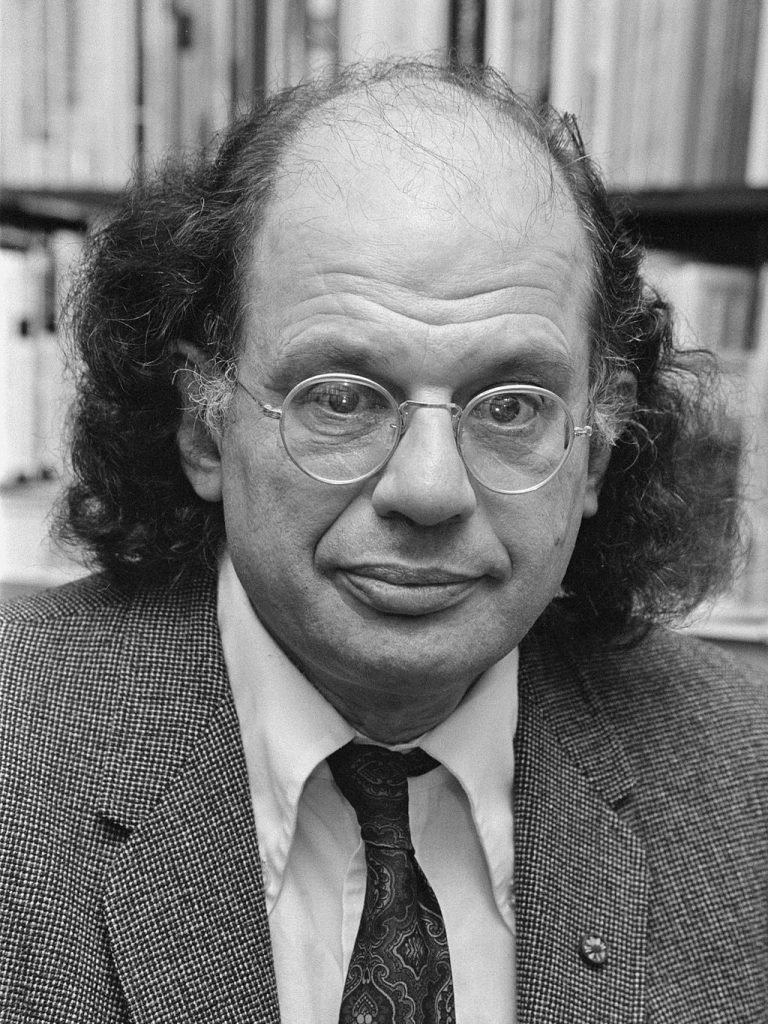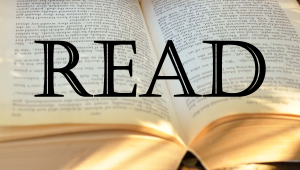94 Allen Ginsberg (1926 – 1997)
Amy Berke; Robert Bleil; Jordan Cofer; and Doug Davis

Wikimedia Commons
CC0 / Public Domain
Ever since he read his groundbreaking poem “Howl” in 1954 to a shocked and enthralled audience at the Six Gallery in San Francisco, Allen Ginsberg has been the poetic voice of America’s counterculture. Ginsberg grew up in Patterson, New Jersey and attended Columbia University in New York City, where he met fellow authors Jack Kerouac (author of On the Road published in 1957) and William S. Burroughs (author of Naked Lunch published in 1959). Although a distinguished student, Ginsberg was temporarily expelled from Columbia for profanity and later spent eight months in a mental institution after pleading insanity when caught storing stolen goods for a drug addict friend. Upon his release, he was befriended by the poet William Carlos Williams, who recognized in Ginsberg a singular talent. After graduating from Columbia and supporting himself with a series of menial jobs in Harlem, Ginsberg moved to San Francisco in 1953 and began a successful, if brief, career as a market researcher. Yet his true calling remained poetry; he was soon fired from his job and, while on unemployment, wrote the poem that would make his reputation as a major American poet: the explosive, furious “Howl,” whose opening lines famously read, “I have seen the best minds of my generation destroyed by madness, starving hysterical naked, / dragging themselves through the negro streets at dawn looking for an angry fix, / angelheaded hipsters burning for the ancient heavenly connection to the starry dynamo in the machine of night…” In San Francisco, Ginsberg found a welcoming community of poets centered around Lawrence Ferlinghetti’s City Lights Bookshop. In 1956, City Lights Books published Ginsberg’s first collection, Howl and Other Poems (which includes the poem selected here, “A Supermarket in California”) only to have the book seized and prosecuted by U.S. Customs for its allegedly indecent depiction of sexuality. From that point on, in numerous volumes of poetry as well as direct political actions from sit-ins to Congressional testimonies, Ginsberg became a singularly oppositional voice in American culture, howling against conformity and war, championing environmentalism and gay rights, and finding beauty in all that American society has beaten down.
Ginsberg’s Howl and Other Poems and his friend Jack Kerouac’s novel On the Road (a roman à clef in which the leftist Ginsberg is the character “Carlo Marx”) are the two definitive works of Beat literature, depicting the countercultural lives of their artists in an improvisatory, spontaneous style akin to jazz music. In 1948, while still living in Harlem, Ginsberg experienced a days-long cosmic vision in which he beheld the beauty of all divine creation and heard the godly voice of British romantic poet William Blake in the sky reciting his Songs of Innocence and Experience (1798). Inspired by this vision and writing under the mentorship of William Carlos Williams, Ginsberg began crafting the poetic style for which he is now known: long, free Whitmanesque lines that find their rhythms in everyday American speech and contain the shockingly personal confessions of the poet himself on topics ranging from his mother’s mental illness to his own open homosexuality. For Ginsberg, the American experience is often one of oppression and loss; Ginsberg’s poetic mission, accordingly, is to recover the beauty of those people and things America herself has cast aside. In the poem “A Supermarket in California” included here, Ginsberg imagines walking with his poetic ancestor Walt Whitman through a modern-day supermarket, showing the great American romantic what his beautiful nation has become.
“A Supermarket in California”
 “A Supermarket in California.” Collected Poems, 1947-1997, by Allen Ginsberg, New York : HarperCollins Publishers, 2006, p. 144. Internet Archive, http://archive.org/details/collectedpoems190000gins_s3u0.
“A Supermarket in California.” Collected Poems, 1947-1997, by Allen Ginsberg, New York : HarperCollins Publishers, 2006, p. 144. Internet Archive, http://archive.org/details/collectedpoems190000gins_s3u0.
or read the selection at the link below:
https://www.poetryfoundation.org/poems/47660/a-supermarket-in-california
Or watch Ginsberg:
Poetry Breaks: Allen Ginsberg Reads “A Supermarket in California.” Directed by Poets.org, 2017. YouTube, https://youtu.be/AhTh01CO60Y?t=30.
Publisher of Allen Ginsberg’s Howl and Other Poems (1956), City Lights Books is an independent San Francisco bookstore and publisher associated with the Beat Literature movement.
Represented in this book by Allen Ginsberg, Beat Literature is the product of a group of mid-twentieth century authors known as the Beat Generation, whose members also include the well-known novelists Jack Kerouac and William S. Burroughs. Authors of the Beat Generation represented America’s countercultures while critiquing its materialism during the era of cultural conformity and national prosperity that followed World War II.
A phrase associated with the American Beat poet Allen Ginsberg, cosmic vision refers to the days-long state of heightened spiritual awareness the poet reported to have experienced while living in Harlem in 1948.

